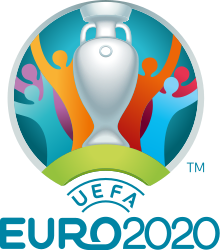
Back Fußball-Europameisterschaft 2021 ALS بطولة أمم أوروبا 2020 Arabic Eurocopa 2020 AST UEFA Avro 2020 Azerbaijani UEFA Euro 2020 BAN Чэмпіянат Еўропы па футболе 2020 Byelorussian Чэмпіянат Эўропы па футболе 2020 году BE-X-OLD Европейско първенство по футбол 2020 Bulgarian উয়েফা ইউরো ২০২০ Bengali/Bangla Evropsko prvenstvo u nogometu 2020. BS
 Live It. For Real. | |
| Tournament details | |
|---|---|
| Host countries | Azerbaijan Denmark England Germany Hungary Italy Netherlands Romania Russia Scotland Spain |
| Dates | 11 June – 11 July 2021 |
| Teams | 24 |
| Venue(s) | 11 (in 11 host cities) |
| Final positions | |
| Champions | |
| Runners-up | |
| Tournament statistics | |
| Matches played | 51 |
| Goals scored | 142 (2.78 per match) |
| Attendance | 1,099,278 (21,554 per match) |
| Top scorer(s) | (5 goals each) |
| Best player(s) | |
| Best young player | |
← 2016 2024 → | |
The 2020 UEFA European Football Championship, commonly referred to as UEFA Euro 2020 or simply Euro 2020, was the 16th UEFA European Championship, the quadrennial international men's football championship of Europe organised by the Union of European Football Associations (UEFA).[1] To celebrate the 60th anniversary of the European Championship competition, UEFA president Michel Platini declared that the tournament would be hosted in several nations as a "romantic" one-off event, with 11 cities in 11 UEFA countries each providing venues for the tournament, making it the second senior international tournament in history after the 2007 AFC Asian Cup to have more than two nations co-hosting it.[2]
Portugal were the defending champions, but were eliminated in the round of 16 by Belgium.[3] Italy won their second European Championship title by beating England on penalties in the final following a 1–1 draw after extra time.[4] The win came exactly on the 39th anniversary of Italy's 1982 FIFA World Cup final victory over West Germany.[5]
The tournament was originally intended to be played between 12 June and 12 July 2020.[6] Due to COVID-19 restrictions during that year, the tournament was postponed to June and July 2021, while retaining the name UEFA Euro 2020 and host venues. Alongside special rules regarding COVID-19 restrictions, UEFA also allowed two extra substitutions[7] and implemented video assistant referee (VAR) for the first time.[8] Initially, there were 13 venues chosen for the tournament but two were later dropped. Brussels was dropped in December 2017 after the city's Eurostadium was abandoned,[9] while Dublin was dropped in April 2021 because there was no guarantee that spectators could attend. Spain originally intended to use Bilbao as a host venue but later changed it to Seville to allow for spectators at matches.[10] UEFA chose Stadio Olimpico in Rome to host the opening match between Italy and Turkey, while Wembley Stadium in London was selected as a semi-final and final venue for the second time,[11] following the 1996 tournament at the original stadium of the same name.
The tournament was well received by fans and commentators, with the most goals per game in a European Championship since the introduction of the group stage, and only two goalless games. The refereeing style was also praised, with a conservative use of VAR and quick decisions made on the pitch.
- ^ "Regulations of the UEFA European Football Championship 2018–20". UEFA.com. Union of European Football Associations. 9 March 2018. Archived from the original on 11 May 2021. Retrieved 11 May 2021.
- ^ Croke, Ruaidhrí (14 January 2020). "Dublin to Baku: What's the cost of Euro 2020 for the planet?". The Irish Times. Retrieved 22 June 2020.
- ^ "Belgium 1–0 Portugal: Holders dethroned by Thorgan Hazard". UEFA.com. Union of European Football Associations. 27 June 2021. Retrieved 28 June 2021.
- ^ "Italy 1–1 England, aet (3–2 on pens): Donnarumma the hero as Azzurri win Euro 2020!". UEFA.com. Union of European Football Associations. 11 July 2021. Retrieved 11 July 2021.
- ^ "1982 FIFA World Cup Spain™". FIFA.com. Retrieved 27 November 2021.[permanent dead link]
- ^ Nicholas Veevers (17 March 2020). "Mark Bullingham Speaks on Postponement of UEFA Euro 2020 and Covid-19 Updates". English Football Association. Retrieved 31 January 2020.
- ^ Cite error: The named reference
substitutionswas invoked but never defined (see the help page). - ^ "VAR to be introduced in 2019/20 UEFA Champions League". UEFA.com. Union of European Football Associations. 27 September 2018. Retrieved 27 September 2018.
- ^ Cite error: The named reference
opening matchwas invoked but never defined (see the help page). - ^ Cite error: The named reference
change of venueswas invoked but never defined (see the help page). - ^ Cite error: The named reference
Wembley Hostwas invoked but never defined (see the help page).